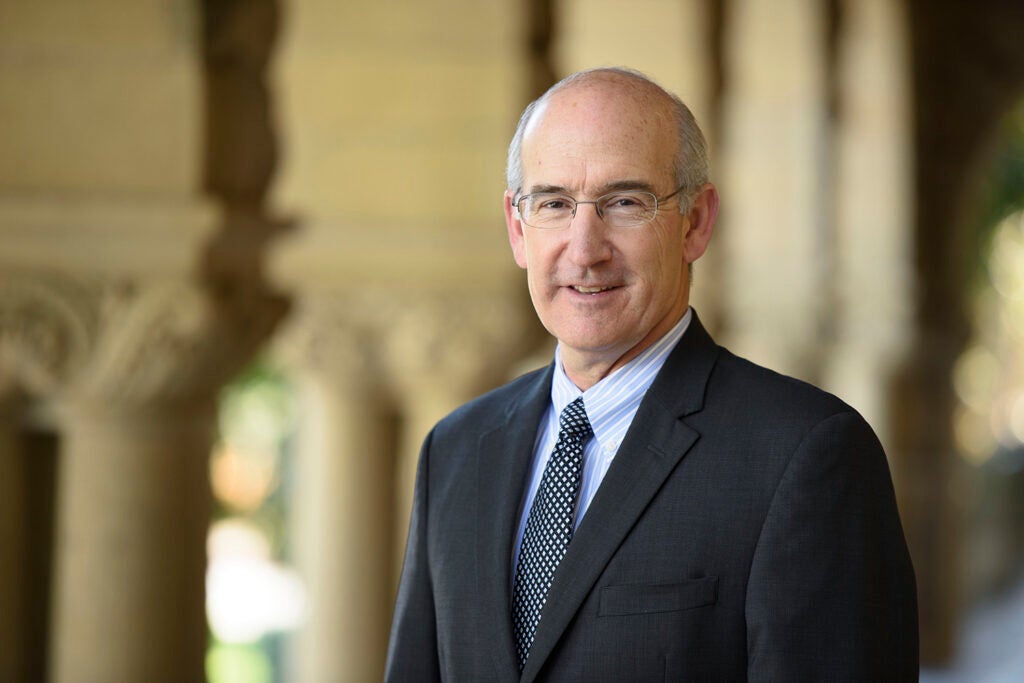Parting thoughts from Rick Moyer, Stanford’s chief risk officer
On the eve of his retirement, Rick Moyer, Stanford’s chief risk officer, reflects on why it’s important to talk about integrity, what he’ll miss most about Stanford and how everyone can promote a culture of doing the right thing.
As the chief risk officer at Stanford for the past five years, Rick Moyer oversaw programs focused on enterprise risk management, risk management insurance, internal audits, privacy, ethics and compliance and – jointly with the university chief information officer – information security.
In this role, Moyer has staffed and supported the audit, compliance and risk committees for the Stanford University Board of Trustees, the boards of Stanford Health Care and Stanford Children’s Health and the Board of Overseers of the SLAC National Accelerator Laboratory. In addition, Moyer has served as a member of the University Cabinet, the Enterprise Risk Management (ERM), Ethics and Compliance Steering Committee, the SLAC Director’s Assurance Council and the hospitals’ Committees on Management Controls and Compliance.
Moyer, who began his career at Stanford as the chief audit executive and institutional compliance officer in 2006, retires this month. In a recent interview, he reflected on why it’s important to talk about integrity, what he’ll miss most about Stanford and how everyone can promote a culture of doing the right thing.
How has the ethics and compliance landscape changed during your time as chief risk officer?
In recent years, there has been an increased focus on the culture of ethics. All the attention in the media and public discourse on ethical issues such as free speech, climate sustainability, and diversity and equity highlight how much of a critical issue ethics is in the world right now.
Ethics is at the core of Stanford’s Long-Range Vision, which states there is a “strategic imperative of embedding ethics in everything we do.”
As a university leader, how do you incorporate the concept of ethics into your work?
A leader’s job is to set the “tone at the top,” by modeling their values, which sets the expectation that team members will do the same. One way I have done this is through monthly staff meetings, where we regularly discussed the importance of values in our work and recognized team members for behaviors that exemplify our values. In my mind, the most important value is integrity, or more simply put, “doing the right thing.”
I am extraordinarily passionate about developing leaders with a strong commitment to ethics and integrity. I have helped create several leadership development programs at Stanford, focused on building future leaders at Stanford. One such program is the Talent Development Program within Business Affairs which supports leaders through exposure, education and experience. Sometimes “doing the right thing” takes real courage, which is why this program strives to provide opportunities that enhance self-confidence and the ability to speak truth to leadership.
What role can the rest of us play in promoting an ethical culture at Stanford?
Everyone can strive to show up as their best self each and every day. Admittedly, it’s not always easy – we are all human and there are certainly factors that can make it challenging to do so – but it should be the expectation and the norm that we all try to act with integrity, be honest and forthcoming, treat people with respect and stand up for what is right, each and every day.
The Ethics and Compliance team within the Office of the Chief Risk Officer has developed a training that is focused on exactly that: starting an ongoing dialogue among teams about the importance of integrity and trust, enabling Stanford to carry out its mission more effectively. Acting with integrity also involves raising questions or concerns. Everyone in the Stanford community plays a role in building a culture of integrity and trust by speaking up and by acting on concerns that are raised.
What is the Office of Ethics and Compliance doing to promote this culture?
The office manages the Ethics and Compliance Helpline, a resource for the Stanford community to contact with questions or concerns. Every concern is taken seriously and reviewed carefully.
If a concern requires additional information to be gathered, an inquiry or formal investigation will be conducted. Once the review process is complete, Stanford will take any necessary action to address the concern. In addition to the Helpline, the Ethics and Compliance team is rolling out an Ethics and Compliance Training program focusing on values set forth in the Stanford Code of Conduct, particularly integrity and trust. It is certainly a challenge to reach everyone in our decentralized environment, but the office hopes to partner with Schools and units around campus. Reach out to Ethics and Compliance if interested in partnering/learning more integrity@stanford.edu.
What will you miss most about daily life at Stanford University?
The people! I have an outstanding team that I really enjoy working with. In addition, I have enjoyed the challenge and opportunity of supporting our amazingly talented and dedicated Board members and leadership across all Stanford entities.
